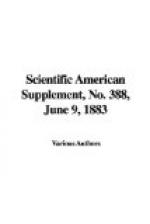I suppose that we all consider ourselves to be sufficiently impressed with the importance of ventilation. If I should stop here to declaim against foul exhalations, or to dwell upon the virtues of fresh air, you might feel inclined to interrupt me by saying, “Oh, we know all about that! If you have anything practical to advance, come to the point.” Gentlemen, I beg your pardon, but I must say that the great fact concerning ventilation, as yet, is that its strongest advocates are not conscious of one-half the seriousness of the subject; and the second fact is that the supposed means of ventilation prescribed by science fail to secure it.
This, then, is my point to-night—the supreme necessity, still urgent, and universally urgent, for a reformation of the breath of life. I believe in a promised time when the days of a man’s life shall again be as the days of a tree. And next to the abolition of vice and sin, I believe that the very grandest factor of such result must be an entire disuse of obstructed air for the lungs. I propose to bring forward some evidence of the necessity, and likewise of the possibility, of a reform so radical and sweeping as this. The subject is too wide for the occasion. I shall be able to read only extracts from what I have prepared, in the few minutes that you can give with patience to my unpracticed lecturing.
The best prescription that doctors have to give (when we are not too far gone to take it) is to live out of doors. Why is this? Why is life out of doors proverbially synonymous with robust health? Why is it that a superior vitality, and a singular exemption from disease, notoriously distinguish dwellers in the open air, by land or sea? Without disparaging the virtues of exercise or of bracing temperature, indispensable as these are for the recuperation of enfeebled constitutions, we must admit that among the native and settled inhabitants of the open air high health is the rule in warm climates as well as in cold, and with the very laziest mortals that bask in the sun, or loaf in the woods. The fact is that simple vegetative health seems to be nearly independent of all other external conditions but that of a pure natural diet for the lungs. Man in nature seems to thrive as spontaneously as plants, by the free grace of air, earth, and sun. On the other hand, the very diseases from which houses are supposed to defend us—that most numerous class resulting from colds—are the special scourge of the lives that are most carefully shielded from their commonly supposed cause—exposure to the open air. Those diseases diminish, and entirely disappear, just so far as exposure in the pure and freely moving air becomes complete and habitual. Soldiers, inured to camp life, catch cold if they once sleep in a house; and, generally speaking, the inhabitants of the free air contract colds only by exposure to confined exhalations from their own or other bodies, within the walls of houses. The explanation of




